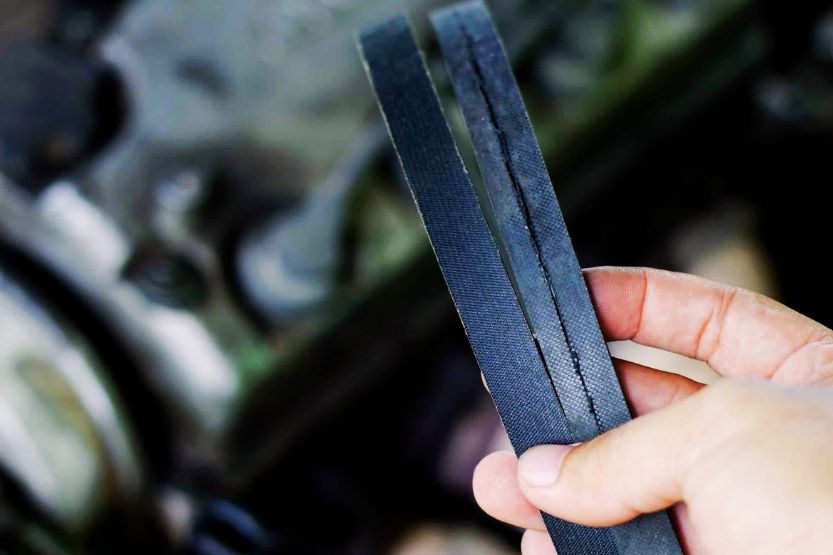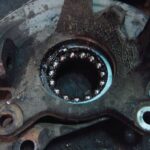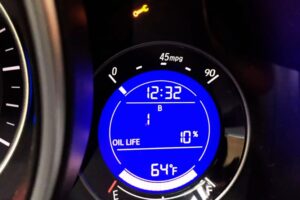It’s normal for your car to produce bits of noise here and there while it is running. However, if you hear whirring sounds from your vehicle, it could indicate that something is wrong. In this article, I’ll discuss cars making whirring noise when driving – the main causes.
Whirring noise usually varies depending on how slow or fast your car is running. It could indicate several issues, including a malfunctioning steering pump, an air conditioning system problem, an alternator issue, a low power steering fluid, or a faulty water pump.
The faster you drive, the more you will hear the whirring noise. You need to have your car inspected to see the real cause of the problem. The longer you delay your visit to a car shop, the more serious the whirring sounds will become.
Read on to learn more about the possible causes of your car’s whirring noise and its ramifications.
Also, we hope you find the links here helpful. We may get a commission if you purchase something through a link on this page, so thank you.
Car Making Whirring Noise When Driving

If your car produces whirring noise, it could stem from different causes, depending on how slow or fast you are driving.
Some of the most common causes include an issue with the air-conditioning system, a faulty water pump, a bad alternator, a malfunctioning power steering pump, or a low power steering fluid level.
You will most often hear this whirring sound as you accelerate your car. The more you go faster, the louder you hear the whirring sound will become. Don’t wait until the problems get worse.
You need to bring your car to the service shop so a qualified mechanic can diagnose it correctly and apply the correct fix.
What to Do If Your Car Is Making a Whirring Noise?
It’s not enough to know the causes of the whirring noise on the surface. As they say: “the devil is in the details.” If you want to correct it, you should know the details of the problem. In that regard, here is the necessary information you need to know about this problem.
First, let us discuss when this whirring sound can come from your car while driving:
1. When It Is Accelerating
You will feel unnerved when your car makes a whirring noise when accelerating. This is the usual occasion when your vehicle can produce this abnormal sound. If you are experiencing this, the problem could stem from the transmission.
Causes
The problem could be caused by the following:
- Low transmission fluid
- Worn-out gears in the transmission
- Low power steering fluid level
- Failing alternator bearings
- Bad water pump
- Damaged piston
- Malfunctioning air conditioning compressor
What You Need to Do
Transmission problems require professional diagnosis and fixes. Your car’s transmission components are a critical component in the operation of your vehicle, so you must treat this problem seriously.
You need to bring your car to a qualified mechanic so they can properly diagnose your vehicle and apply the required fix s. You can’t do it yourself.
2. When It Is Turning
You can also hear a whirring noise from your car when you turn the steering wheel. If this is what you are experiencing, there is a likelihood that a failing steering system causes the problem. The belt could be loose or damaged.
If the steering system is still okay, the problem could be a low steering fluid level.
If you need a new power steering fluid, there’s a Johnson power steering fluid available at Amazon:
Click here to see Johnsen’s 4611 Power Steering Fluid on Amazon.
What You Need to Do
You need to inspect your steering belt and see if it is loose or damaged. If this belt is already loose, that is the cause of the whirring sound. You need to tighten it if it is loose and replace it if it is already damaged.
If the steering fluid is below the recommended level, you must top it up. You should also check if there’s a leak in the system. If you find a leak in the system, you have to plug it in to stop the leak
3. When It Is Idling

You may also hear a whirring noise from your car when it is idling. If you have a newer car, it will sound like a purring kitten while idling. But if you have already been using it for some years, it will no longer sound that way.
Instead, you may even hear it whirring or whining while the engine is idle. If this is what you are experiencing, you may have an oil leak, the valves inside your engine are stuck, or your engine oil needs topping up.
What You Need to Do
The best thing you should do is to bring your car to your trusted mechanic to have it properly diagnosed. If the mechanic can pinpoint the cause, they can apply the correct fix.
Considering the probable causes of this problem, you can see that only a car mechanic with the right tools and know-how can apply whatever is the necessary fix.
Again, what causes the car to make a whirring noise when driving? When a car makes a whirring noise when driving, it can be due to a faulty water pump, a malfunctioning steering pump, a failing alternator, air conditioning system issues, or a low power steering fluid level.
What Are the Causes of Car Whirring Noise?

Now, we are ready to discuss the causes of this problem in detail. You have to deal with every potential source of problems to prevent your car from having severe issues.
Let’s take them up one by one:
1. Slipping, Cracked, or Dry Serpentine Belt
The serpentine belt in your car is the one that drives several components in your vehicle so it can run efficiently. However, it could only do its job if it is in good shape. What usually happens is that this belt will dry and crack over time, causing it to slip from the grooves of the pulleys it drives.
This belt will be unable to grip the pulleys it is driving, or if it can do it, it will not be as efficient as before. So, you will experience belt slippage. It will produce whirring sounds as it slips on the pulleys. This can lead to more damage to the belt.
If you ignore this problem, it will grow worse. Eventually, it will lead to the serpentine belt snapping altogether. If this happens, your car will not be able to move anymore. You will be forced to stop and get stranded wherever it occurs.
If your car’s serpentine belt is already defective, you can buy a replacement at Amazon.
Click here to see this Goodyear Belts 1060495 Serpentine Belt on Amazon.
2. Transmission Problems
The transmission is a critical component of your car. Usually, you are the one selecting the gears and the speed that you want for your vehicle. However, over time, your car’s transmission system will deteriorate and not operate optimally, especially if you don’t practice the proper driving habits.
In some instances, the transmission will manifest its problem by producing a whirring noise from the car while you are driving it. This kind of whirring noise from the information can be challenging to locate, mainly if it originates in the transmission tunnel.
This transmission problem usually indicates a lack of transmission fluid or the transmission fluid pump is not working. If the torque converter in your car fails, it will also produce a whirring sound while you are driving.
It is a severe issue if you find the problem’s source is the transmission. But if it is the torque converter, it will be more serious. You will need to take down the transmission itself. As you may be able to guess, fixing a transmission is a more costly proposition.
3. Worn Wheel Bearings
You need wheel bearings on your car because your wheels can’t freely spin without them. To protect these bearings from the elements, they are housed in unitized h bs. These hubs must be replaced regularly since the bearings cannot be expected to last forever.
Unfortunately, no matter how strong the bearings are, they will eventually wear out over t me. In most cases, when this happens, your car will produce a whirring noise. This noise will vary depending on the speed that your vehicle is running.
As it goes faster, the pitch of the whirring gets higher. So, if this is where the whirring noise of your car originated, the most likely culprit is worn-out wheel bearings.
You should not take this issue lightly because it is also severe. If you fail to solve this problem, it will unseat the wheel bearing cage’s rollers and disengage. If this happens, there will be free play inside the vehicle hub.
Worst case scenario: the wheel hub can break free from the spindle and will seriously damage the components of the wheel-e ds. It could even result in a car wreck.
4. Worn Out Bearings of Belt Driven Components
The parts of your car driven by the serpentine belt have their bearings. Usually, there are at least two bearings per driven component. Some have more than two bearings. Every one of these bearings has its life span.
Your car’s belt-driven components include the following:
- Power steering pump
- Alternator
- Water pump
- Air conditioner compressor
In addition, these systems also use idler pulleys and tension rs. All these car parts with pulleys have their bearings.
When any of these bearings starts failing, you will hear this whirring noise from your car. So, once you hear this whirring noise, you should pay attention and strive to get to the source of the noise.
Failure to do so can lead to bearings being locked up, a damaged belt, and other eventualities that may leave you stranded on the r ad.
Most modern cars use a single serpentine belt to drive all the pulleys that these cars use. So even just one of these bearings locking up will make you unable to drive your vehicle.
In Closing
The whirring noise you may hear from your car usually depends on how fast or slow you drive. It could indicate several issues which you need to address promptly.
The various causes of this strange sound can include a faulty steering pump, a problem with the conditioning system, a failing alternator, low power steering fluid, or a bad water pump.
Don’t take this problem lightly. If you do, the minor problem could blow up, and you may be forced to spend more than you should if you address it right away.





![Car Making a Creaking Noise When Driving Slow [7 Causes] car making a creaking noise when driving slow](https://roadsumo.com/wp-content/uploads/2022/07/car-making-a-creaking-noise-when-driving-slow-150x150.jpeg)
![CV Joint Noise [When Driving Straight or Turning] cv joint noise](https://roadsumo.com/wp-content/uploads/2021/06/cv-joint-noise-150x150.jpg)




![Read more about the article CV Shaft [CV Axle Shaft Explained – And When to Replace]](https://roadsumo.com/wp-content/uploads/2021/12/CV-shaft-300x200.jpg)

![Read more about the article DRL Warning Light [What Does It Mean, Causes, and How to Fix]](https://roadsumo.com/wp-content/uploads/2022/04/what-does-the-drl-warning-light-mean-300x200.jpg)